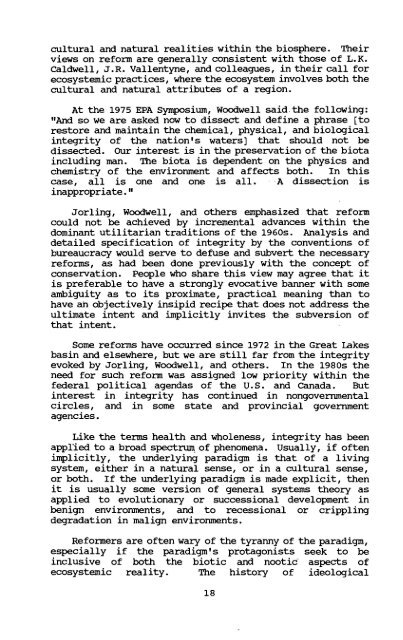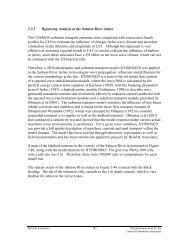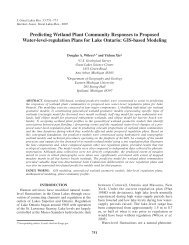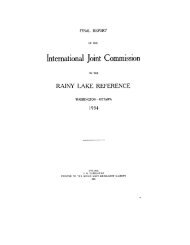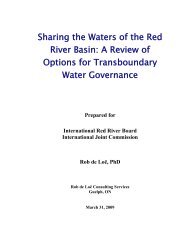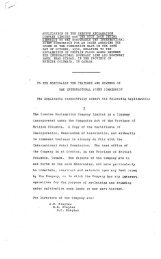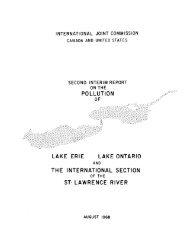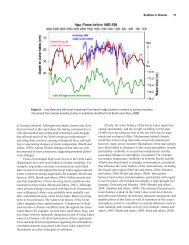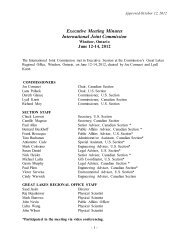- Page 1 and 2: ECO TO THE INTEGRITY OF THE GREAT L
- Page 3 and 4: Support of this publication by the
- Page 5 and 6: J. Edwards represented SAB; and Hen
- Page 7 and 8: Theoretical Framework for Developin
- Page 9 and 10: During the Symposium, it was noted
- Page 11 and 12: I can but assert that the essential
- Page 13 and 14: Water quality must be of the highes
- Page 15 and 16: I have only one way to insure no di
- Page 17 and 18: case. . . . From a pragmatic standp
- Page 19 and 20: A program premised upon the establi
- Page 21 and 22: Holding the Line No further degrada
- Page 23: INTEGRITY AND SURPRISE IN THE GREAT
- Page 27 and 28: mitigation relates to &d culture an
- Page 29 and 30: mismanagement of sewage works, and
- Page 31 and 32: FOSTERING INTEGRITY IN AN AGE OF SU
- Page 33 and 34: The stress-response approach, as de
- Page 35 and 36: natural associations that are alrea
- Page 37 and 38: Individuals that serve strong econo
- Page 39 and 40: (xi) Degradation of aesthetics; (xi
- Page 41 and 42: Woodwell, G.M. 1977. Biological int
- Page 43 and 44: it is used in the Great Lakes Water
- Page 45 and 46: adapt to perturbation, can both be
- Page 47 and 48: promote this through exercise, diet
- Page 49 and 50: 3. For the classic dis~ssion of the
- Page 51 and 52: The GWQA requires that a remedial a
- Page 53 and 54: what is not good about different st
- Page 55 and 56: external influence3 but less adapti
- Page 57 and 58: An extended view of integrity is th
- Page 59 and 60: human systems. Put simply, they awe
- Page 61 and 62: as a human need and, hence, a commo
- Page 63 and 64: measures, if undertaken properly, w
- Page 65 and 66: question of repairing biological pr
- Page 67 and 68: Legally enshrined terms such as int
- Page 69 and 70: See von Bertalanffy, L. 1950. The t
- Page 71 and 72: 24. Holling, C.S. Ecosystem design:
- Page 73 and 74: ECOSYSTEM INFEGRITY AND NETWORK THE
- Page 75 and 76:
might appear that autocatalysis can
- Page 77 and 78:
development, any increase in the pr
- Page 79 and 80:
ecosystem elements of interest; e.g
- Page 81 and 82:
Ulanowicz , R. E. 1986b. A phenomen
- Page 83 and 84:
the members of a society interpret
- Page 85 and 86:
coherent knowledge base, yielding a
- Page 87 and 88:
eality is fundamentally correct, an
- Page 89 and 90:
een recognized in subatomic physics
- Page 91 and 92:
culture, human beings become orient
- Page 93 and 94:
NOTES 1. The ideal type of techniqu
- Page 95 and 96:
water bcdy resulted in the appearan
- Page 97 and 98:
4) Different members of society wil
- Page 99 and 100:
total costs of ecological damage or
- Page 101 and 102:
As noted by Everett (1979), this ap
- Page 103 and 104:
The net result of these problems is
- Page 105 and 106:
ller, F.G. 1974. Benefit-cost analy
- Page 107 and 108:
IWPEGRITY AND SURPRISE IN THE GREAT
- Page 109 and 110:
theory as it is most often applied
- Page 111 and 112:
a position beyond information towar
- Page 113 and 114:
them. From the point of view of the
- Page 115 and 116:
chosen from the group. The standard
- Page 117 and 118:
est developed and appropriate to Gr
- Page 119 and 120:
potential of Ulanowiczts technical
- Page 121 and 122:
Kay, J.J. 1983. Self-oryanization a
- Page 123 and 124:
hierarchy theory. self-organizing s
- Page 125 and 126:
configuration. For example, gravita
- Page 127 and 128:
unpredictable. Middle-number system
- Page 129 and 130:
Integrity comes through constraint.
- Page 131 and 132:
Allen, T.F.H., and E.P. Wileyto. 19
- Page 133 and 134:
greater detail, and only the most g
- Page 135 and 136:
statistical thermodynamics revealed
- Page 137 and 138:
Force-flux relationships do not alw
- Page 139 and 140:
1) multiple evolutionary trajectori
- Page 141 and 142:
3) reduce the total number of react
- Page 143 and 144:
input, removal, or accumulation, co
- Page 145 and 146:
eplacement, the species diversity t
- Page 147 and 148:
The numerical difference between a
- Page 149 and 150:
Certain choices of environmental va
- Page 151 and 152:
On the other hand, thermodynamics a
- Page 153 and 154:
Morowitz, H.J. 1968. Energy flow in
- Page 155 and 156:
2) We must understand basic cause-a
- Page 157 and 158:
Fontaine and Lesht (1987) used stat
- Page 159 and 160:
We suggest that exercising control
- Page 161 and 162:
aggregates, age-class specific stoc
- Page 163 and 164:
correspond to the point in time tha
- Page 165 and 166:
insufficient information on coupled
- Page 167 and 168:
Bartell, S.M., R.H. Gardner, R.V. O
- Page 169 and 170:
THEORETICAL FRAMEWORK FOR DEVEIllPI
- Page 171:
BIOINDICATOR OBTECTIVES IN THE GREA
- Page 174 and 175:
the Index of Biotic Integrity (IBI)
- Page 176 and 177:
TABLE 2. integrity. potential metri
- Page 178 and 179:
of strict funding, public accountab
- Page 180 and 181:
The managerial advantages in such i
- Page 182 and 183:
more thorough and competent the exa
- Page 184 and 185:
organization'' (Kay 1990) . Fig. 2
- Page 186 and 187:
efficacy of zoobenthos as indicator
- Page 188 and 189:
1. Unfortunately, most studies oper
- Page 190 and 191:
that is, the index of response is a
- Page 192 and 193:
Patrick, R. 1975. Identifying integ
- Page 194 and 195:
George Francis Department of Enviro
- Page 196 and 197:
FEDERAL FH)ERAC International Joint
- Page 198 and 199:
navigation, hydropower generation a
- Page 200 and 201:
inational network of groups sharing
- Page 202 and 203:
professional experts suggests there
- Page 204 and 205:
Ecosystem integrity for the Great L
- Page 206 and 207:
Meisner, J.D., L. Goodier, and H.A.
- Page 208 and 209:
will be considered to be consistent
- Page 210 and 211:
For any real ecosystem, a particula
- Page 212 and 213:
Rutledge (1974) showed that a short
- Page 214 and 215:
State V&e ~ifru?cation Point State
- Page 216 and 217:
An example of this case is the clea
- Page 218 and 219:
something big happens in between sa
- Page 220 and 221:
When an ecosystem is described as b
- Page 222 and 223:
with the idea of an N-dimensional s
- Page 224 and 225:
TABLE 1. Environmental factors and
- Page 226 and 227:
TABLE 2. A tabular model of ecologi
- Page 228 and 229:
Another possibility is that the sta
- Page 230 and 231:
State Variable PI PZ P3 State Varia
- Page 232 and 233:
1. It is theoretically possible by
- Page 234 and 235:
Nicolis, G., and I. Prigogine. 1977
- Page 236 and 237:
AQUATIC =NIC COMMUNITIES: SURROGATE
- Page 238 and 239:
always retain control of the prey t
- Page 240 and 241:
the high levels of abundance of the
- Page 242 and 243:
a suite of species exemplified by t
- Page 244 and 245:
emergent view, accordingly, is that
- Page 246 and 247:
we often observe in natural systems
- Page 248 and 249:
ecological structures and functions
- Page 250 and 251:
Holling, C.S. 1985. Resilience of e
- Page 252 and 253:
Ryder, R.A., and S.R. Kerr. 1989. H
- Page 254 and 255:
MYTHS AND BDDEL8 OF SYSTEMIC AND OR
- Page 256 and 257:
The first two processes tend to fos
- Page 258 and 259:
A complementary process relates to
- Page 260 and 261:
that reflect key aspects of integra
- Page 262 and 263:
and consumer organisms. Presence of
- Page 264 and 265:
~ollingwood, R.G. 1946. The idea of
- Page 266 and 267:
Steedman, R.J. 1988. Modification a
- Page 268 and 269:
they will be required (by the ecosy
- Page 270 and 271:
6) Forbidden zone implies a state i
- Page 272 and 273:
3) Lack of a prenrentive .approach.
- Page 274 and 275:
2) Can we tell when the processes t
- Page 276 and 277:
Government is not wholly consistent
- Page 278 and 279:
Awareness of an environmental crisi
- Page 280 and 281:
EOOIOGY: ANALYTICAL APmcOACRES TO P
- Page 282 and 283:
(Fonnan and Godron 1981, 1986). Suc
- Page 284 and 285:
such as photosynthesis and transpir
- Page 286 and 287:
8) grid cell analysis: grid cell ov
- Page 288 and 289:
Turner 1987). Models at the individ
- Page 290 and 291:
Wlchwald, K. 1963. Die Industrieges
- Page 292 and 293:
Milne, B.T. 1988. Measuring the fra
- Page 294:
Vesecky, J.F., and R.H. Steward. 19


